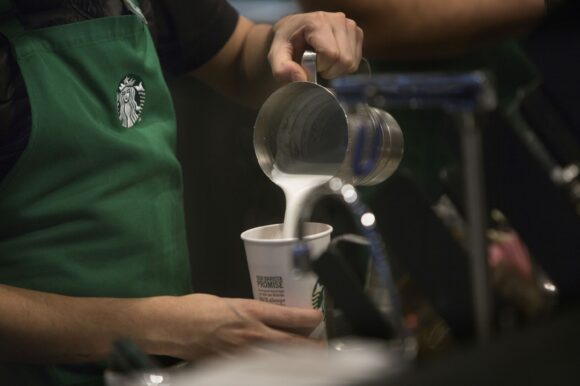The U.S. Supreme Court on Tuesday steps into the contentious unionization drive at Starbucks as the coffee chain challenges a judicial order requiring it to rehire seven employees at a Tennessee cafe who were fired as they pursued efforts to organize.
The justices are set to hear arguments in the company’s appeal of a lower court’s approval of an injunction sought by the U.S. National Labor Relations Board ordering the reinstatement of the workers. It is a case that could make it harder to bring a quick halt to labor practices challenged as unfair under federal law while the NLRB resolves complaints.
The case centers on the legal standard that federal courts must use to issue a preliminary injunction requested by the NLRB under the a federal law called the National Labor Relations Act. Such orders are intended as an interim tool to halt unfair labor practices while a case is proceeding before the board.
Under section 10(j) of the labor law, a court may grant an injunction if it is deemed “just and proper.” Starbucks contends that if the lower courts had applied stricter criteria, similar to the standard used by some other courts and in non-labor legal disputes, the case would have come out differently.
About 400 Starbucks locations in the United States have unionized, involving more than 10,000 employees. Both sides at times have accused the other of unlawful or improper conduct.
Hundreds of complaints have been filed with the NLRB accusing Starbucks of unlawful labor practices such as firing union supporters, spying on workers and closing stores during labor campaigns. Starbucks has denied wrongdoing and said it respects the right of workers to choose whether to unionize.
In a break from the acrimony, both sides in February said they had agreed to create a “framework” to guide organizing and collective bargaining and potentially settle scores of pending legal disputes.
The case began in 2022, when the workers at the Poplar Avenue store in Memphis became among the first to unionize. Early in their efforts, they allowed a television news crew into the Starbucks cafe after hours to talk about the union campaign. Seven workers present that evening were fired, including several who belonged to the union organizing committee.
Despite the dismissals, employees there later voted to join Workers United.
The union filed unfair labor charges with the NLRB over the firings and other discipline by managers. The NLRB sought an injunction, alleging that Starbucks unlawfully fired the workers for supporting the union drive and to send a message to other workers.
U.S. District Judge Sheryl Lipman granted the injunction in 2022, reinstating the workers in order to address the “chilling effect” of the dismissals on the unionization effort while the NLRB resolves the case. The Cincinnati, Ohio-based 6th U.S. Circuit Court of Appeals upheld the injunction in 2023.
The 6th Circuit rejected the company’s argument that Lipman should have used a stringent four-factor test to weigh the bid for an injunction, as courts typically do in non-labor disputes. This test includes an assessment of whether the side seeking relief would suffer irreparable harm and is likely to succeed on the merits of the case.
The Supreme Court’s ruling is expected by the end of June.
Was this article valuable?
Here are more articles you may enjoy.


 Navigators Can’t Parse ‘Additional Insured’ Policy Wording in Georgia Explosion Case
Navigators Can’t Parse ‘Additional Insured’ Policy Wording in Georgia Explosion Case  Hackers Hit Sensitive Targets in 37 Nations in Spying Plot
Hackers Hit Sensitive Targets in 37 Nations in Spying Plot  Tesla Sued Over Crash That Trapped, Killed Massachusetts Driver
Tesla Sued Over Crash That Trapped, Killed Massachusetts Driver  One out of 10 Cars Sold in Europe Is Now Made by a Chinese Brand
One out of 10 Cars Sold in Europe Is Now Made by a Chinese Brand 